blog
Raising Young Voices To The Inequality of Education
By: Phoebe Grace Aseoche, Riley’s Way Council member
Every year, Riley’s Way Foundation Councils advocate and take action for a social issue selected by the youth Council members. Past topics have included immigration, food insecurity, racial discrimination, global warming and more. Choosing a social issue and committing to spreading the word of its importance is a prime example of the Riley’s Way mission to “empower young leaders to use kindness and empathy to create meaningful connections and positive change.” This year, we, the Young Women’s Leadership School (TYWLS) of Astoria and Hewitt School Council, chose inequity in education, specifically in standardized testing used to determine students acceptance or success.
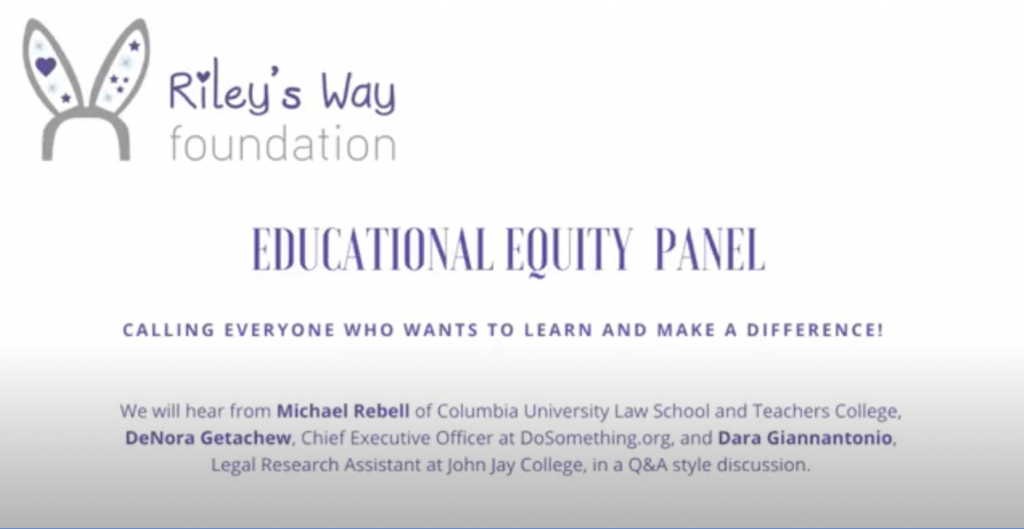 Education is a human right that we have taken advantage of and used to develop the world around us. Using our education, we are able to shape our future and grasp opportunities that bring us a step forward into making our own impact on the world. Over the years, educational standards have become diverse however, has yet to improve in equality and civic education. Council members of Riley’s Way called it to attention on Thursday, June 3rd, at a virtual Educational Equity Panel discussion.
Education is a human right that we have taken advantage of and used to develop the world around us. Using our education, we are able to shape our future and grasp opportunities that bring us a step forward into making our own impact on the world. Over the years, educational standards have become diverse however, has yet to improve in equality and civic education. Council members of Riley’s Way called it to attention on Thursday, June 3rd, at a virtual Educational Equity Panel discussion.
Riley’s Way instills three main values that are constantly shared and used: kindness, empathy and leadership. In order to create a positive and effective future, we need to have kindness and empathy in order to be impactful leaders. With these in mind, we take on a social issue through the lens of empathy and kindness by reaching out to those who may have the same passions for educational justice. Sharing young voices and experiences allow an issue to be recognized and related to by fellow students.
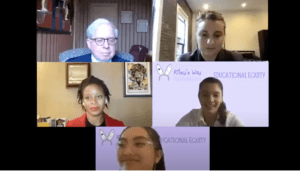 The amazing team of Council members connected with three education experts who are professors, activists, and researchers to get a different perspective. Throughout the panel discussion, issues on the equality of education and its profound impact on students were discussed in depth. This panel included Michael Rebell of Columbia University Law School and Teachers’ College, DeNora Getachew the Chief Executive Officer at DoSomething.org, and Dara Giantonio, Legal Research Assistant at John Jay College, in a Q&A style discussion.
The amazing team of Council members connected with three education experts who are professors, activists, and researchers to get a different perspective. Throughout the panel discussion, issues on the equality of education and its profound impact on students were discussed in depth. This panel included Michael Rebell of Columbia University Law School and Teachers’ College, DeNora Getachew the Chief Executive Officer at DoSomething.org, and Dara Giantonio, Legal Research Assistant at John Jay College, in a Q&A style discussion.
Many interesting points and conclusions were said, however one of the most moving was a quote from Michael Rebell of Columbia University Law School and Teachers’ College; “If life in some sense is a competitive race, everyone’s got to have an equal start at the starting gate and many kids come to school way behind.” This shines a light on the disadvantages that many students may face depending on background or the power that people have over others futures. Even in classrooms, students feel the need to compete on being the best in academics and extracurriculars to be noticed which can be encouraged by schools or families. However, it robs other students that deserve the same chances to be as successful. It shouldn’t be limiting.
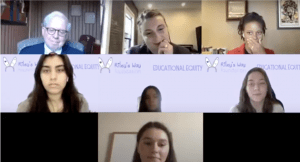 Educational equity is an issue that affects a countless amount of youth in which many stories go untold. There is a major existence of inequality within the system and as Michael Rebell puts it, many unfortunate kids are not at the pedestal as their fortune peers in terms of education. DeNora Getachew, the Chief Executive Officer at DoSomething.org, raises a similar encounter she shares about education inequality. Being the CEO of a reforming platform for many activists, Getachew has been on the forefront of supporting many changes to society including the flaws of education. DoSomething.org is focused on empowering youth who are interested in starting a movement and ready for their voices to be heard with their motto “Take action!” Their causes include education, gun violence, stages of health, sexual harassment and more social issues that need to be brought to our attention.
Educational equity is an issue that affects a countless amount of youth in which many stories go untold. There is a major existence of inequality within the system and as Michael Rebell puts it, many unfortunate kids are not at the pedestal as their fortune peers in terms of education. DeNora Getachew, the Chief Executive Officer at DoSomething.org, raises a similar encounter she shares about education inequality. Being the CEO of a reforming platform for many activists, Getachew has been on the forefront of supporting many changes to society including the flaws of education. DoSomething.org is focused on empowering youth who are interested in starting a movement and ready for their voices to be heard with their motto “Take action!” Their causes include education, gun violence, stages of health, sexual harassment and more social issues that need to be brought to our attention.
Connecting back to Rebell’s initial claim in background being a factor of the disadvantages students may be reminded of, Getachew mentioned the phrase “civic empowerment gap” as the reason why education should be more accessible to those who can’t. Let’s break it down, civic empowerment by definition is making change in one’s community through knowledge, skills, values and striving to make a mark. Whereas gap points to a difference or unfair divide between opposites. Together, they are defined as the unfair advantage that wealthy students have compared to students living in poverty in the education they receive.
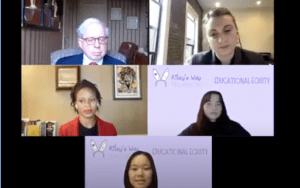 Examining past performance and the education all students from diverse backgrounds have differed. Turns out, wealthy students were given better education and an encouraging learning environment including panels, classroom resources, assignments providing growth in a student to success. Whereas, middle class/students living in poverty have not been given the same standard of education. Instead, their performance has dropped immensely, sabotaging their chances of leaving their impact or having their story heard. These powerful people and organizations have started a discussion that should be heard yet ignored. Something that has been impacting education that is supposed to be fair amongst all students yet is being manipulated.
Examining past performance and the education all students from diverse backgrounds have differed. Turns out, wealthy students were given better education and an encouraging learning environment including panels, classroom resources, assignments providing growth in a student to success. Whereas, middle class/students living in poverty have not been given the same standard of education. Instead, their performance has dropped immensely, sabotaging their chances of leaving their impact or having their story heard. These powerful people and organizations have started a discussion that should be heard yet ignored. Something that has been impacting education that is supposed to be fair amongst all students yet is being manipulated.
The TYWLS Astoria + Hewitt School Riley’s Way Council were determined to bring this issue to light and ignite a movement of change within their communities. Along with hosting the panel on June 3, some of the other members on the council hosted an instagram live presenting the toolkit that they created within the last few months. The toolkit consisted of the different initiatives that can be taken by not only those on the live, but as well as everyone else to ignite the change of betterment within the school system.
The Educational Equity Toolkit addresses the issue and provides detailed resources. Students use the New York City Department of Education Website for forms and guided information in terms of upcoming dates, school alerts and other helpful resources. However, Our team noticed one very important opportunity; how the DOE hasn’t provided a Universal College Entrance Exam Prep program in their High School College Access for All initiative. With juniors and seniors coming out of the age of pandemic where many important academic dates including SAT and ACT prep/exam have been delayed, it is important to take back the reins and ensure that future generations of students would have the same chances to accomplish even more.
The SAT and ACT are the entrance tickets to getting into a good college and as many believe a bright future. Speaking from the perspective of a Junior who overwhelmed herself for the SAT and stressed in weeks before, it isn’t an easy test to pass. Like any other test, it is a test with structure and learnable however the stakes are higher placing more pressure on students both mentally and physically. Although the SAT and ACT standardized testings have become a controversial topic given that they determine your outcome of getting into college, students want equal preparation. The cost to retake the SAT or ACT cost around 52-80 dollars per test. Not many students are able to afford or pay for both tutoring and the exam itself.
With the College Exam Prep Program, students are able to achieve higher scores and not have to be as self-reliant on having a perfect performance to impress colleges. These programs can be in the form of videos or in-person instruction from teachers to guide students on the material and skills tested. More opportunities will be available through the online toolkit shared here. Using the power of social media and networking, we are able to contribute our ideas to many influential people that have the same passion and observation of the inequalities of education.
Together, the Riley’s Way Community was able to bring together people of all ages into a cause that will provide equal guidance in standardized testing. Though standardized testing will always be unfair to those who are less fortunate, the College Exam Prep Program will get students a step closer to achieving great things and a fair chance ticket to a fit college. We used a Panel, social media and this blog to spread the word of how the people of the future are already changing the world for the better. Both Kindness and empathy were used to make students’ wishes come true; callout and balance the tilted scale of educational opportunities.
